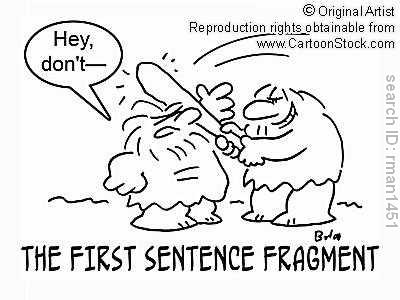Sentence Fragments. Yuck.
I'll admit it: I actually paid attention to my junior high English teacher and learned a fair amount about grammar from her. Even though I later became a music major and much later became a software developer, I still remember much of what she taught me — including what is and is not a sentence.
"This is a sentence."
"But not this one."
A sentence fragment is a group of words that resembles a sentence. It will start with a capital letter and have ending punctuation; but, it is neither an independent clause nor a complete idea. (yourdictionary.com)
 Because I can almost (or actually?) subconsciously spot sentence
fragments while reading books, they can jar me for the wrong reason.
Instead of being engrossed in the story the author is trying to tell me,
I am instead noticing their writing technique. More importantly, I'm
noticing their technique in a negative way.
Because I can almost (or actually?) subconsciously spot sentence
fragments while reading books, they can jar me for the wrong reason.
Instead of being engrossed in the story the author is trying to tell me,
I am instead noticing their writing technique. More importantly, I'm
noticing their technique in a negative way.
Don't get me wrong: there are times and places for sentence fragments. The most common place would be in dialogue, since most of us, including your humble author, use them all the time in everyday conversations. I therefore don't usually mind them in that case while reading, though I do feel that authors should not slavishly try to emulate real dialogue, but rather emulate it enough to feel like it could be actual speech while maintaining enough grammatical structure to properly convey what is being communicated.
I'm also okay with very occasional sentence fragments within the non-dialogue text, almost always to signal something dramatic, important, surprising, or maybe even ironic.
Like this.
However, I feel that some of the current batch of authors are overdoing it; or worse, they don't even know they're doing it. Perhaps this is a symptom of the proliferation of self-publishing and the approaching extinction of the editor.
I recently downloaded a Kindle sample of a book that piqued my interest by an author I did not know. The first two paragraphs consisted in total of five sentence fragments and zero actual sentences. The first real sentence showed up in the third paragraph, which also included another fragment.
That author lost me as a potential customer after one page. I didn't get far enough into it to even start to decide if it was something I'd otherwise consider reading.
Please, authors, if you are doing this on purpose: stop it. Just say, "No," to sentence fragments.
Unless you have a really, really good reason to use one.